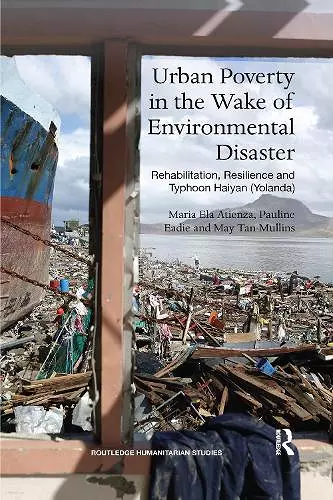Urban Poverty in the Wake of Environmental Disaster
Rehabilitation, Resilience and Typhoon Haiyan (Yolanda)
Pauline Eadie author Maria Ela Atienza author May Tan-Mullins author
Format:Paperback
Publisher:Taylor & Francis Ltd
Published:30th Sep '20
Currently unavailable, and unfortunately no date known when it will be back
This paperback is available in another edition too:
- Hardback£145.00(9781138629998)

This book investigates the best strategies for poverty alleviation in post-disaster urban environments, and the conditions necessary for the success and scaling up of these strategies. Using the case study of Typhoon Yolanda (Haiyan) in the Philippines, the strongest typhoon ever to make landfall, the book aims to draw out policy recommendations relevant for other middle- and lower-income countries facing similar urban environmental challenges.
Humans are increasingly living in densely populated and highly vulnerable areas, often coastal. This increased density of human settlements leads to increased material damage and high death tolls, and this vulnerability is often exacerbated by climate change. This book focuses on urban population risk, vulnerability to disasters, resilience to environmental shocks, and adaptation in relation to paths in and out of poverty.
Using both qualitative and quantitative methods, including primary survey data from victims and those charged with overseeing the relief effort in the Philippines, Urban Poverty in the Wake of Environmental Disaster has significant implications for disaster risk reduction as it relates to the urban poor and is highly recommended for scholars and practitioners of development studies, environment studies, and disaster relief and risk reduction.
"This book invites reflection on the politics and possibilities of governance in perilous times. It offers empirically-grounded insights about the structural causes of vulnerability and challenges readers to consider innovative solutions to disaster response, rebuilding and rehabilitation." — Nicole Curato, Senior Research Fellow, Centre for Deliberative Democracy and Global Governance, University of Canberra, Australia
"With their cutting-edge research on post-disaster relief and recovery, Pauline Eadie and her team deliver valuable lessons-learned from the aftermath of Typhoon Yolanda in the Philippines. If you want to know how post disaster poverty-relief strategies succeed or fail and why, this is the book!" — Deirdre McKay, Keele University, UK and author of Global Filipinos and Archipelago of Care
"Finally, a definitive and comprehensive assessment of Typhoon Yolanda has been produced. This book will be useful for everyone who aims to understand what happened, what has been done, and why certain disaster relief and rehabilitation strategies worked while others did not, before, during and after Typhoon Yolanda. This book also offers valuable guidance on how similar work should be undertaken in the future. The book is encompassing in its treatment of post-Yolanda recovery and assessment of the predicaments that arose during post-disaster reconstruction. While it will not provide solace to those who are dismayed at the outcomes, it will at least provide clarity on some of the nagging questions that remain about why rehabilitation efforts stalled after the initial humanitarian and emergency recovery phase ended. The findings and implications presented in this book are representative of the five year time frame since Typhoon Yolanda. However the post-Yolanda rehabilitation effort is an ongoing process and many of the issues raised are yet to be resolved. This will continue to be the case, until durable disaster rehabilitation solutions can be developed and lessons are learned." — Albert Salamanca, Senior Research Fellow, Stockholm Environment Institute
"Attuned to the cultural norms of communities and the power struggles behind well-meaning but clumsy bureaucratic procedure, this book exposes both profound and ordinary obstacles to accountable disaster response. This is a must-read for geographers, sociologists, and development scholars and practitioners interested in the politics of aid." — Jonathan Corpus Ong, Associate Professor of Global Digital Media, University of Massachusetts at Amherst, USA
"This book is a powerful reminder to practitioners, scholars and students that we must consider the immediate and long-term impacts of disasters on one of the most vulnerable groups in post-disaster recovery: the urban poor. This multi-year study is essential reading for anyone seeking to understand poverty alleviation in post-disaster urban environments." – Yvonne Su, University of Guelph, Canada
ISBN: 9780367661489
Dimensions: unknown
Weight: 453g
192 pages